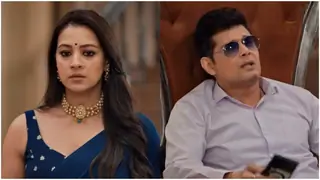for those who may not be able to open the link, here is the text.
cheers!
Talent Hunt Epidemic
Shubha Mudgal
Acclaimed both in India and around the world, Shubha Mudgal is among
the leading vocalists of the younger generation in the realm of Indian
Classical Music (Hindustani). She is also known for her successful forays
into folk, devotional, popular and film music.
The much beleaguered world of Indian classical music, struggling to keep
its head up in the face of all odds, has now been dealt a spate of cruel
blows by an unlikely enemy the hugely successful, steadily burgeoning
string of talent hunts on virtually every television channel in the country.
At least two of the many talent contests on television channels have
decided to go the classical (pronounce klaasikal) way by cheekily
appropriating terms connected with Indian classical music with a lack of
sensitivity that doesnt surprise me in the least. What does amaze me is
that the many purists and traditionalists and great vidwaans of Indian
music have stood mute witness to this bold daylight robbery, and at
times have even aided and abetted it without so much as a murmur.
Lets first take a look at the greatly successful Fame Gurukul on Sony
Television. I have a big axe to grind with whoever coined the name for
this show because he/she or they obviously never went to one. Why does
one go to a gurukul in the first place? I would imagine it would be to
obtain Gnyaan or knowledge, wisdom, mastery, skill and expertise, but
certainly not fame or money. The knowledge gained from the gurukul
may then prepare the learner for a life of success and fame and glory. But
nowhere in the Indian tradition does one hear of a gurukul for fame
alone.
Further, a gurukul is always presided over by the guru, a Master who
imparts knowledge to disciples. Not so at Fame Gurukul, if we are to
believe what we see! Frankly, all I have been able to see of the two young
gurus at Fame Gurukul are the briefest and often most apologetic shots
of two young individuals, one male and the other female, seated
occasionally with one or the other participant across a harmonium. More
television time is given to the horseplay between the participants or even
their outings and shopping sprees than to their actual taleem or
learning sessions! Hey, how about renaming the show Forget Your Gurus
Gurukul? What? No? Aw shucks? Thats too many syllables, says the
numerologist? Sigh!!!
Worse still, the young participants are made to dance and gesticulate
while singing with the admonition that it isnt enough to just sing. You
have to be a performer to succeed in todays world. By that logic, it
would not just be difficult but well nigh impossible for Lata ji, Asha ji, Rafi
Sahab, Mukesh ji, or even Shankar Mahadevan and KK, two brilliant
singers who also judge the Fame Gurukul contest, to win had they been
participants. All the recording and dubbing sessions I have attended have
had most singers come in and stand in front of a mike and deliver the
song without any of the shenanigans that are now forced on the young
Gurukulites. In fact, as far as I can see, the poor young things might have
been able to sing a trifle better had they not been made to swing and
shift around unnaturally.
And that brings me to Sa Re Ga Ma Pa Challenge 2005 on Zee TV, the
other contest with a professed classical twist! Fortunately, this show
doesnt insist on having the contestants gyrate while they sing, and that
perhaps is one of the reasons why we hear some better singing on this
show. Unfortunately, that is also one of the only good things I can say
about the show because on this one the five mentors namely, Aadesh
Shrivastava, Ismail Durbar, Jatin-Lalit and Himesh Reshammiya, all
successful music directors for Indian films pose as Gharana specialists.
The term gharana is typical of Hindustani classical music and denotes a
distinct musical style taught to members of a family or to successive
generations of disciples.
A gharana, we are told by the old and wise, comes in to being only when
at least three generations of musicians follow the same style. But director
Gajendra Singh obviously didnt listen to the old or wise, did he, when he
decided to bestow gharana-dom on the five willing mentors he chose for
his show? They didnt even bother to analyze whether they had a distinct
musical style to claim as their own. After all, musical styles are not
created on the fast track. Not only does it take decades for a musical style
to evolve and mature, but a pre-requisite of a gharana demands that
several generations follow the same style. How come there isnt any
R.D.Burman Gharana or a C. Ramachandra or a Jaidev or even a Vanraj
Bhatia Gharana? All of these composers had unique musical styles that
were typical of them. And yet they didnt claim to have formed gharanas!
What are these mentors hoping to teach their young charges? Music,
musical style or sheer arrogance and swagger? As mentors, they have a
responsibility towards their charges and the least they should do is to
give them accurate information about music. And to be able to do so,
they will first have to relinquish their claim to being leaders or founders
of gharanas.
Another pseudo classical touch to this show is the little puja that each
participant is made to undergo with his or her mentor, modeled on the
gandaa-bandhan ceremony that students of Hindustani music observe
when they are formally inducted into the gurus extended family. The five
mentors on Challenge 2005 willingly go through this sacrosanct
ceremony on television, heedless of the fact that their charges may have
been learning for years from some other guru and will probably go back
to the same guru after Challenge 2005 makes way for Challenge 2006 or
whatever else is to follow. Surely they are aware of the protocol followed
by Indian musicians? No honorable musician accepts another musicians
disciple as their own unless the disciple can prove that the transition is
being made with the permission or ijaazat of the former guru. If the
director of the show is unaware of these niceties and etiquette, surely the
mentors themselves could point out the weak links, coming as some of
them do, from families of classical musicians.
I must point out here that I dont have the slightest intention of pulling
down talent hunts. I have nothing against them and the fact that they are
acquiring epidemic proportions is proof enough of their popularity. What I
am protesting about is the long lasting effect they will have on young
minds. Two years from now people may believe that a gurukul is a space
on television where you do the most embarrassing things you have ever
done in order to be declared a Super Singer or an Idol or a Golden Voice
who finally gets to sing a Chavvanni Or Athanni wala song. If the
makers of these shows are keen on promoting classical music, how come
they havent ever thought of presenting a show dedicated to true blue
classical music? Thousands of deserving young students who devote their
lives to the serious study of Indian classical music would benefit from the
opportunity and we would all get to hear some good music too in the
bargain. Anyone listening? Mentors, directors, sponsors, heads of
channels? If you are, how about bursting into tears on the show and
admitting that you havent been fair to classical music so far! After all, it
is reality TV and would make for great television!
This article is featured on SAWF with the author's permission. It was first
published in Tehelka.

















